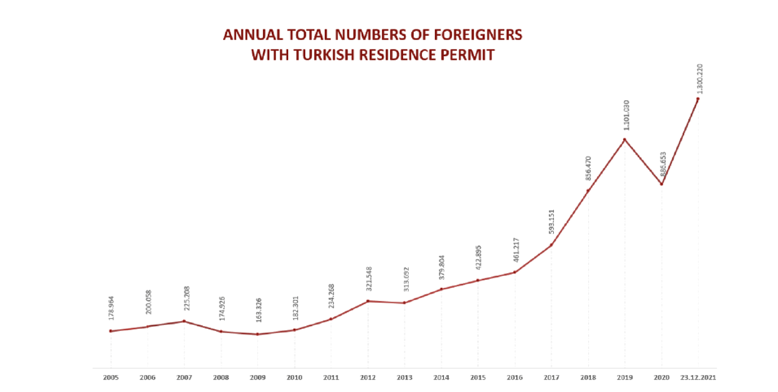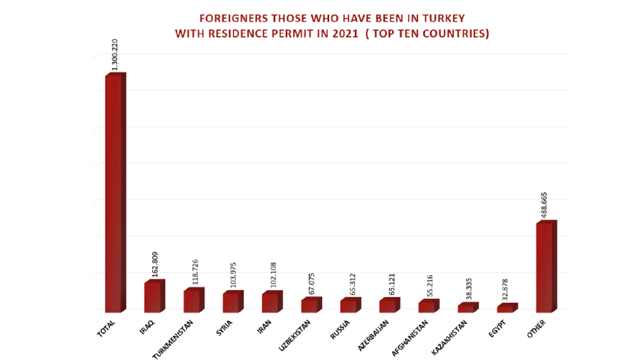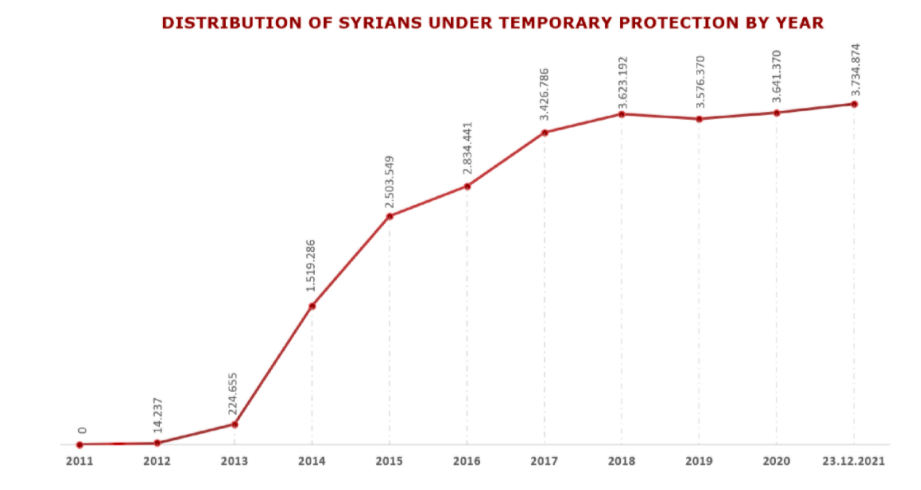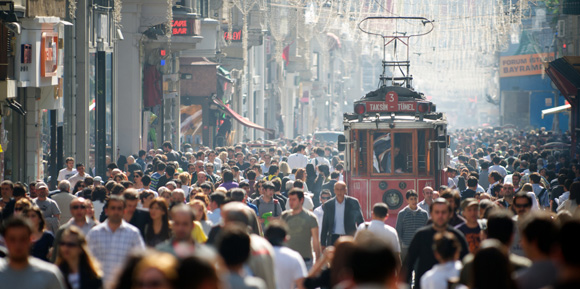Levent Kenez/Stockholm
The number of foreigners living legally in Turkey in 2021 has increased to a record level, Nordic Monitor research shows. Those under temporary protection make up the largest share, while the number of people with residence permits has reached the highest level in history as well, with a sevenfold increase in the last 10 years. Turkey, which has become a hub for migration routes from East to West, also hosts a large contingent of undocumented refugees whose exact numbers are unknown.
According to official statistics obtained by Nordic Monitor, there were a total of 1,300,220 foreigners with residence permits in Turkey in 2021, compared to 886,652 in 2020. The most common type of residence permit was a short-term residence permit granted to 954,812 people. Foreigners who own real estate in Turkey and tourists who extended their stay most frequently applied for short-term residence permits. There are 114,732 people in Turkey with student residence permits. Foreign nationals who are married to a Turkish citizen or have children with them benefit from a family residence permit, which was given to 89,595 people in 2021.

Countries whose citizens benefited the most from residence permits were Iraq, Turkmenistan, Syria, Iran and Uzbekistan. Azeris top the list for student residence permits in Turkey. Again Azeris, Uzbeks and Russians comprise the majority of foreigners living legally in Turkey with family residence permits.
The city most preferred by foreigners with residence permits by far is İstanbul, with 684,054 people. İstanbul is followed by Ankara and Antalya. According to official data, Tunceli (Dersim), a city heavily populated by Alevis, is the place where the fewest foreigners live, just 48 people.

Turkey traditionally does not grant immigrant status to refugees. No matter how long they stay or work in Turkey, very few can become citizens, and only their residence permits are extended. In 2017 Turkey kicked off a real estate campaign to encourage the sale of housing to foreigners to meet its foreign exchange needs. In addition to that, it was also announced that a residence permit for one year would be granted to foreigners who buy a house in Turkey, regardless of price. Turkish citizenship was promised to foreigners who bought real estate priced at $1 million. In 2019 this limit was reduced to $250,000, leading to an increase in housing sales. The opposition has harshly criticized the government for selling the citizenship of the Republic of Turkey and devaluing it.
Turkey has been giving temporary protection status to refugees fleeing Syria since 2011. There were 3,734,876 Syrians under temporary protection in Turkey in 2021.
According to Turkey’s General Directorate of Migration Management, as of December 23, 2021 the province with the largest number of Syrians was Istanbul, with 533,737 refugees. Gaziantep, a southern city, followed Istanbul with 460,496. A total of 101,851 Syrians live in Ankara, whose population is around 5.6 million.
When the number of Syrians is compared to the general population, the highest rate can be found in the small southern province of Kilis, where Syrians comprise 75.51 percent of residents. The lowest rate is 0.04 percent, in Bayburt, where only 34 Syrians officially live. Registered Syrians under temporary protection status account for 4.54 percent of the population of Turkey, which is 82,280,952.

A worsening economy and the opposition’s pressure on refugees are causing a radical change in the government narrative. Turkish President Recep Tayyip Erdoğan often stated in the past that hosting Syrian refugees in Turkey was a religious duty as well as a matter of conscience. It is no secret that Erdoğan holds a trump card against the European Union by keeping Syrian refugees in Turkey and that this prevents the EU from imposing any sanctions for his anti-democratic actions against his critics.
However, the changing public mood shows that Erdoğan will not be able to use refugees or irregular migrants at the negotiating table for much longer. President Erdoğan in September said for the first time that he was aware of the Turkish public’s unease about refugees. He reiterated that the country had reinforced its border with Iran with the military, gendarmerie and police and that a wall being erected along the frontier was nearing completion. Regarding migrants, Erdoğan also said if the people of Europe live in peace and security today, it is thanks to Turkey’s sacrifices, which the opposition considered a political confession.
According to the data, there are 5,035,094 foreigners legally in Turkey, including Syrians who are under protection and those who have residence permits. There is also a large, illegal Afghan and Syrian population in Turkey. Many people from Cental Asian countries come to Turkey to work illegally. Although their number is low, there are Africans who were just passing through Turkey who have not yet been able to leave the country.












